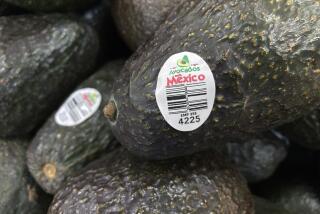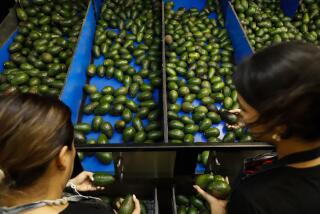Inspection of Chilean Fruit May Take Week
- Share via
As a crew of 20 inspectors worked through bunch after bunch of Chilean grapes in a Southland warehouse, checking for cyanide contamination, federal regulators gave the go-ahead to begin the same process on stored pears and nectarines.
But the U.S. Food and Drug Administration also said that none of the fruit can be passed and the boxes stamped “Inspected and Cleared” until a 5% sample of an entire boatload has been inspected.
“It looks to me like it will be next week” before any of the fruits--including grapes--are released, said Jeff Waite, manager of Pacific Cold Storage in City of Industry. “I don’t see anything being shipped before Monday--assuming (the FDA) releases it quickly when we finish inspecting.” Waite said the inspection crews at his plant began with 33 pallets of grapes to check, each bearing a ton of fruit. After 10 hours, 26 pallets remained to be inspected.
Pears, like apples, can be held in storage for several weeks, Waite said. But softer stone fruits--such as nectarines, plums and peaches--are much more perishable.
“Nectarines ripen before almost anything else,” he said. “(Skippers) will have to start thinking seriously about whether they’re savable at this point.” In other words, by the time the softer fruit is cleared for distribution it may no longer be marketable and have to be dumped.
Meanwhile, Vons, the biggest supermarket chain in Southern California, said it will not stock even the cleared fruit now in storage. A spokeswoman said Vons decided to await inspected fruit from freighters still at sea rather than accept fruit that has been in storage on land for up to a week.
The FDA began allowing inspection of 5% samples of stored grapes and berries as importers recruited and trained new crews under FDA supervision.
More to Read
Eat your way across L.A.
Get our weekly Tasting Notes newsletter for reviews, news and more.
You may occasionally receive promotional content from the Los Angeles Times.










